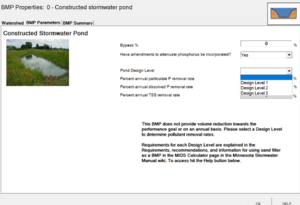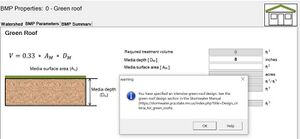
Summary of changes in Version 4 Minimal Impact Design Standards (MIDS) Calculator Revision as of 23:32, 16 March 2021 by Mtrojan (talk | contribs) (→Constructed ponds with an iron bench)
Version 3 of the Minimal Impact Design Standards (MIDS) Calculator (Calculator) was updated to Version 4 in Fall, 2020. This page provides a summary of updates from Version 3 to Version 4 of the Calculator.
Constructed ponds with an iron bench
| Pollutant removal percent for different pond conditions and design levels | ||||||
| Design level | Particulate phosphorus | Dissolved phosphorus | TSS | |||
| No amendment | With amendment | No amendment | With amendment | No amendment | With amendment | |
| 1 | 60 | 60 | 0 | 40 | 60 | 60 |
| 2 | 84 | 84 | 8 | 40 | 84 | 84 |
| 3 | 90 | 90 | 23 | 40 | 90 | 90 |
Users can now specify a constructed stormwater pond with an iron-enhanced filtration bench to allow dissolved phosphorus removal. To achieve this, the Calculator incorporates the same question and same dissolved phosphorus removal percent as for sand filters in Version 3:
"Have amendments to attenuate phosphorus been incorporated?"
Although the question does not specify iron as the amendment, iron is the most likely amendment, based on current knowledge. Answering "YES" to the question about an amendment results in dissolved phosphorus reduction of 40%. Removal of particulate phosphorus and total suspended solids are unchanged. Design level requirements are the same with or without an amendment. It is assumed that the amendment is incorporated following recommended design, construction, and maintenance guidance in this manual.
For information on using the constructed pond BMP in the Calculator, go to this link.
Green roofs - intensive roofs
Users can now incorporate intensive green roofs (i.e. greater than 4 inches of media depth) into a green roof design. This change was created by allowing the user to select a media depth greater than 4 inches. When the user specifies a depth greater than 4 inches the following warning appears:
"you have specified an intensive green roof design. See the green roof design section in the Stormwater Manual.
6. Incorporate swale side slope into swale main channel BMPs (swale main channel and swale main channel with an underdrain), to be named swale with no underdrain and swale with underdrain. In the new BMP interface: a. Questions and calculations are described in Appendix A b. For each side slope, utilize the same inputs and calculations as the Version 3 side slope BMP c. Modify the Results tab to reflect results for the side slope(s) and main channel 7. Reduce the wet swale removal rate for TSS to 35% 8. For bioretention and tree trench with underdrain, change the question Is a soil amendment used to attenuate phosphorus? to Do you have a properly designed phosphorus treatment layer or area in your system (e.g. iron enhanced layer)? and provide a link to https://stormwater.pca.state.mn.us/index.php?title=Design_criteria_for_bioretention#Layered_systems 9. For bioretention basin with underdrain, tree trench with underdrain, and swale with underdrain, when a user includes an amendment for phosphorus retention, change the particulate phosphorus retention from 0% to 40% 10. For bioretention basin with underdrain and tree trench with underdrain, for the question Bioretention planting media mix, add Other. In addition to Mixes A and B, if the user selects Other for media mix, display the cell for the question Is the P content of the media less than 30 mg/kg? (i.e. this cell is greyed out when the user selects Mix C or Mix D). 11. For sand filter, create three treatment levels similar to those currently used for constructed stormwater ponds. MPCA will communicate the three levels to Barr after meeting with stakeholders. 12. For infiltration BMPs (BMPs without an underdrain), if the user answered yes to the question Are you using the calculator to determine compliance with a Construction Stormwater permit? on the Site Information tab, do not allow the user to select D soils. If the user selects a user-defined infiltration rate, ensure this value is >= 0.2 inches per hour. 13. Adjust the PP removal numbers down to match TSS removal for Permeable Pavement (74%), Swale Main Channel w/o underdrain (68%) and Level 1 Stormwater Pond (60%) 14. For non-volume reduction BMPs, request the user to manually input a “bypass percentage” (e.g., 28% bypass) within the BMP properties dialog box. 15. For non-volume reduction BMPs, track treated vs untreated pollutant load and assign a fractional adjustment of the percent reduction (PR%) applied to the treated load 16. For practices with an underdrain, if the practice is undersized, calculate water that bypasses the practice and provide no treatment for the bypass water 17. On the Results screen, under Summary Information, create a line in the P section for Total P removed by BMPs (add particulate and dissolved removed). Units for this are lbs. 18. On the Results screen, in the BMP Summary section, add a section called Total Phosphorus Summary, which contains information similar to the other P sections. 19. Update the value for tree interception. This value will be provided by the MPCA PM. 20. For tree trench system/Box, after the input asking for total media depth, add this input: Total media and soil depth available for tree rooting. When computing the number of trees allowed at a site, use this value instead of the media depth.

